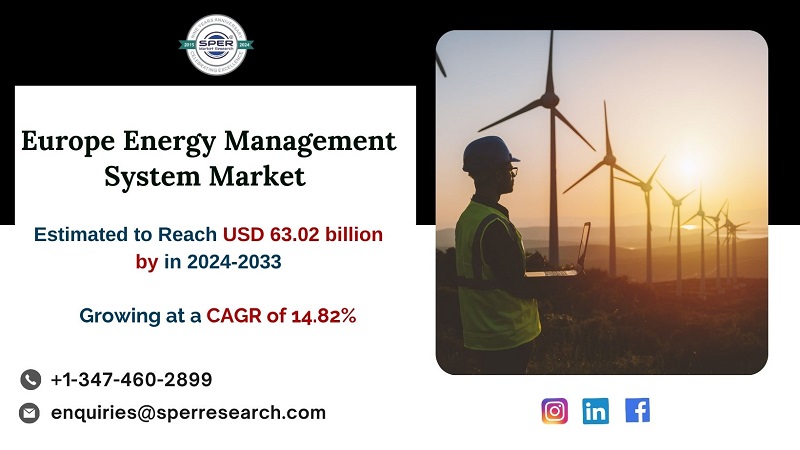An Energy Management System (EMS) is a comprehensive system that monitors, controls, and optimizes the energy consumption of buildings, businesses, and organizations. It integrates a number of hardware and software tools to collect, assess, and execute strategies for increasing energy efficiency, lowering operational costs, and achieving sustainability objectives. EMS is widely used in a variety of industries, including residential, commercial, and industrial, to manage energy consumption more intelligently and cost-effectively. An energy management system (EMS) gathers real-time data from energy meters, sensors, and gadgets throughout a facility. This data is then analyzed using specialized software to identify inefficiencies, track energy usage patterns, and detect anomalies or excessive consumption. EMS also allows for the automation of energy-saving processes.
According to SPER Market Research, ‘Europe Energy Management Systems Market Size- By Service, By Component, By Application – Regional Outlook, Competitive Strategies and Segment Forecast to 2033’ states that the Europe Energy Management Systems Market is estimated to reach USD 63.02 billion by 2033 with a CAGR of 14.82%.
Drivers:
One of the most important motivators is the region’s commitment to stringent energy-efficiency regulations and sustainability goals. The European Union (EU) has established a variety of laws and initiatives, such as the Energy Efficiency Directive and the Renewable Energy Directive, which mandate energy savings, emissions reductions, and the adoption of energy-efficient technologies. These laws incentivize businesses and organizations to invest in EMS to meet legal obligations while also optimizing energy consumption and cutting costs. Another important trend is the increasing usage of renewable energy sources such as wind, solar, and hydropower across Europe. Energy management systems will become more significant as renewable energy is integrated into power grids.
Restraints:
The European energy management systems (EMS) market has a variety of challenges that may limit its growth. One of the most major concerns is the high upfront cost of implementing EMS solutions. Many firms, particularly small and medium-sized enterprises (SMEs), struggle to make the initial investment in energy management systems, which comprises the necessary hardware, software, and infrastructure. While EMS provides long-term cost savings through energy efficiency, the considerable capital expenditure may deter widespread adoption, especially in places with limited budgets or economic limitations. Another major concern is the complexity of integration. EMS solutions must seamlessly interface with existing energy systems, meters, and building management infrastructure. However, legacy systems in older buildings or industrial environments may be incompatible with current EMS technologies, forcing costly updates.
Request Free Sample Report: https://www.sperresearch.com/report-store/europe-energy-management-system-market.aspx?sample=1
The COVID-19 outbreak had a mixed impact on Europe’s energy management systems (EMS) industry. Initially, the pandemic caused delays in various industries due to lockdowns and social distancing measures, stifling EMS installation efforts. Many businesses, particularly those in the manufacturing and real estate industries, had operational and financial challenges, causing energy management activities to be postponed or terminated. The economic crisis and uncertainties about future investments have caused firms to be more cautious about capital expenditures, including the installation of EMS systems. However, as the epidemic progressed, some trends emerged that helped the EMS industry. One significant factor was Europe’s quick transition to remote work and digitization. As employees worked remotely, the energy consumption patterns in offices and industrial facilities changed dramatically.
Germany is dominating the Europe energy management systems market due to its advanced industrial sector, strong government initiatives on energy efficiency. Major players in the market are Abb Limited, Dexma Sensors Sl, Ingersoll Rand, Eaton Corporation, Emerson Electric Co., Engie Impact, General Electric, Honeywell International Inc.
Europe Energy Management Systems Market Segmentation:
By Service: Based on the Service, Europe Energy Management Systems Market is segmented as; IEMS, BEMS, HEMS.
By Component: Based on the Component, Europe Energy Management Systems Market is segmented as; Metering & Field Equipment, Hardware, Software, Networking Device, Control Systems.
By Application: Based on the Application, Europe Energy Management Systems Market is segmented as; Power & Energy, IT, Manufacturing, Enterprise, Healthcare, Others.
By Region: This research also include data for Germany, UK, France, Spain, Italy.
For More Information, refer to below link: –
Europe Energy Management System Market Outlook
Related Reports:
Follow Us –
LinkedIn | Instagram | Facebook | Twitter
Contact Us:
Sara Lopes, Business Consultant – U.S.A.
+1-347-460-2899



